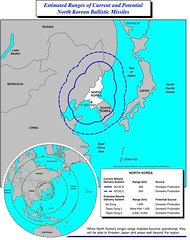Kim Jong Il Becomes a Liability for China
 Wasn’t it just yesterday when the United States had finally begun to reduce the U.S. military footprint on Okinawa, after years of local residents’ demands? That was then.
Wasn’t it just yesterday when the United States had finally begun to reduce the U.S. military footprint on Okinawa, after years of local residents’ demands? That was then.
Tokyo and Washington will deploy advanced Patriot interceptor missiles in Japan for the first time, officials said Monday amid concerns North Korea may be preparing to test-fire a long-range ballistic missile.
The U.S. and Japan reached an accord on the interceptors this month after reports of the possible test-firing became public, and they plan to install the weapons on American bases in Japan as soon as possible, Japan’s Defense Agency said.
North Korea’s extortion-seeking exhibition of a Taepodong II missile is a study in unintended consequences. Last week, Clinton alumni — those on whose watch North Korea went nuclear and fired a missile over Japan — called for bombing it on the launch pad. In the following days, Republicans alternatively urged calm and direct talks (read: payoff) with the North Koreans … and also, in one case, bombing. Fortunately, those ideas are non-starters. A first strike probably wouldn’t escalate to Korean War II, but it would mark a potentially irreversible political setback for U.S. interests in the region, thus compromising the more urgent effort against North Korean proliferation and the greater long-term effort against Chinese hegemony. Talks? We can expect those to accomplish about as much as the myriad negotiators, proposals, and agreements, signed and otherwise, have accomplished since 1992: bupkes. The answer here will have to follow the difficult path of patient and wise statecraft that correctly identifies and deals with the greater threat: a regime that is irredeemably committed to acquiring and trafficking weapons of mass murder, uninhibited by the regard for human life on which peace-making must be based.
Among North Korea’s neighbors, the new threat has caused introspection about their own vulnerabilities, and on their dependence on the United States. South Korea finds itself in an especially unenviable place. Having reordered its diplomatic doctrine around neutrality and independence from the United States, it finds itself cut out of the U.S. policymaking process and consigned to watching American politicians debate shockingly bad ideas on the Sunday morning talk shows. For the last several years, South Korea has earned a reputation for stinginess in sharing its own intel with the United States and promiscuous leaking of U.S. secrets, not to mention its own. Today, South Korea is feeling its lack of a suitable independent capability and finds itself dependent on U.S. surveillance to help it react to a crisis:
[T]he Korean military currently gets 100 percent of strategy information and 70 percent of tactical information from the USFK. Regarding the signal intelligence on North Korea and image data, it depends on the U.S. more than 90 percent.
Japan, which has its own satellite reconaissance capability, is frantically expanding of its cooperation with the United States on missile defense, a trend China must fear will expand among its neighbors on the Pacific Rim. For a moment, the Mandarins in Beijing must have ceased tittering into their palms over America’s frustration with the North. Japan’s agreement to join the United States on missile defense research promises to add much technological value to the limited and developmental U.S. capabilities, and Taiwan has fresh plans to purchase PAC-3’s of its own.
The present crisis atmosphere could inspire other governments to either expand their own militaries or draw closer to the United States, perhaps even heralding a de facto Pacific Treaty Organization. Neither trend would be celebrated in China, which has patiently pursued the “Finlandization” of U.S. allies and the expansion of its influence in the region.
[Map from the Federation of American Scientists; hat tip to Yi Sun Shin.]
1 Response